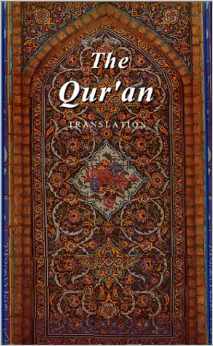
While scholars and pundits debate whether in fact we are facing a “Clash of Civilizations” (in Samuel Huntington’s words) between the West and Islam, there is a different kind of encounter that is possible in universities in many parts of the world. Christians and Muslims attend classes together, form friendships, compete on intramural teams, and stay up late together sometimes, talking about the deepest questions. While such conversations can’t resolve the violent clashes occurring elsewhere, no one knows what might happen where conversations of respect and mutual understanding across religious differences occur.
Barbara Hampton has given us a wonderful resource to foster such conversations in her study guide, Reading Scripture Together: A Comparative Bible and Qur’an Study Guide. . . . — From Review: Reading Scripture Together: A Comparative Bible and Qur’an Study Guide by Bob Trube (Bob on Books, 2/18/2014).
Inspired by Bob’s review I contacted Barbara J. Hampton to learn more about the story behind and the content in her new publication. What a privilege to share this interview with the Emerging Scholars Network.
Tom: Why did you write Reading Scripture Together: A Comparative Qur’an and Bible Study Guide? What is the story behind its publication?
Barbara: In 2000, as an adjunct at the College of Wooster (Ohio) where my husband was in the math department and we were faculty advisors to Wooster Christian Fellowship, I was teaching a First Year Seminar (FYS) with the theme of “Voices of Conscience in the 20th Century.” One of the speakers at our public lecture series connected to FYS was the president of Planned Parenthood. I couldn’t teach that topic without voicing my own conscience and so planned a silent prayer vigil of protest. This generated a lot of anxiety and discussion on campus (a story in its own right), but an unexpected outcome of that was a Pakistani alumna reading about it in the student newspaper. She emailed me and suggested that I would make a good Muslim since I was pro-life and would I like to convert! I answered that I would be delighted to learn about Islam if I could share about Christianity. And so began our email “dialogue.” From there, with much study along the way, I designed a set of lessons for my church’s adult Sunday school focusing in on several primary doctrines of Christianity and Islam.
I became intrigued with the idea of doing an inductive study of the Qur’an, applying the same style of learning as I had been trained to do for Scripture through InterVarsity Christian Fellowship (IVCF). Now, the Qur’an is a different kind of holy book, as God’s actual words were meant to be recited and memorized, not “studied.” However foolishly or not, I plunged ahead on the assumption that students would participate in a study like this because of the enduring value of the Qur’an to civilization (as all great literature has). Much as an evangelistic Bible study—or in IVCF parlance a Group Investigating God (GIG)—no assumptions as to the source of the text need to be made. In fact, I modified the GIG format with challenges and testimonies (even testimonies of Muslims). My assumption is that if the Bible (or the Qur’an) is God’s truth, the Holy Spirit will make that evident through the study. In other words, the text will do its own convincing. One difference from a typical IVCF Bible study is the extensive leader’s notes about the Qur’an, as very few people come to the text with much prior knowledge.
After I designed the six (later seven) studies—on Ishmael and Isaac (Genesis 21), who God is (Exodus 3), who Jesus is (John 8), what salvation is (Luke 15), what is a text (II Tim 3), and how we should live out our faith (verses from the Sermon on the Mount) and comparative Qur’an passages—I asked some Christian and Muslim students whom I knew at Wooster and who were friends with each other to study these passages together. Four sets of students did the studies in the next couple of years and I am in touch with almost all of them today, all of whom express the fondest of memories of our time together. My hope is through the self-published version, others will be able to do similar studies with their Muslim friends. Friendship is the other key ingredient.

Tom: Wow! What an amazing story and development process for such a significant resource. Anything else that would be helpful to know about the format of the Bible study?
Barbara: The study looks like any published Bible study guide your readers would be familiar with. In addition to the topics already mentioned, there is a study on the crucifixion (Mark 15). I have tried to be as balanced and fair as I can in the presentation of the material—I was never able to find a Muslim who would create the studies on the Qur’an—but the leader’s notes do reveal my “bias.” It can be purchased through Amazon (only):
Reading Scripture Together
http://www.amazon.com/Reading-Scripture-Together-Comparative-Quran/dp/0615956548/
Tom: Getting back to the big picture, what three or four points do you desire every reader to take away from Reading Scripture Together?

Barbara: The guide is meant to be used in “dialogue,” but it can be used individually or in small group to understand Islam from its textual sources. In that regard, I hope that readers will be able to get a larger textual context for understanding Islam. It is very easy, given the Qur’anic structure, to “proof text” the Qur’an as a violent (or as a peaceful) religion and we are subjected to that kind of rhetoric all the time. Good inductive study allows for awareness of context and the leader’s notes assist in this as well.
I hope that readers will become aware of how God reveals himself in the Bible as a lover of all peoples and how we are to reflect his love to those around us and not to be afraid of Muslims.
I hope that this resource will embolden Christians, particularly on campuses where we rub shoulders with Muslims all the time, to invite their friends to study scripture together. If we respect their text (i.e., them and what they value) enough to study it, they will be glad to study ours. The Bible holds up well! 🙂
Tom: To wrap up, please tell me a little more about genuine dialogue on campus, in the community, across cultures . . . in particular for one who affirms Christ Jesus as Lord and Savior.
Barbara: Genuine dialogue depends on two things: love of the truth and love of people—see the intro of the book for this in larger form. Dialogue is not just agreeing to disagree nor is it shooting “truth” darts from behind a barrier. It worked at Wooster, and I am sure it is working on many other campus contexts, because true friends, who care about each other, are willing to risk their security to share what they believe to be true and to – really – hear what their friend is saying. If there is fear, there can’t be dialogue. Recently I was talking with a professor of religion who has written about Islam and teaches at a Christian college. He said that so few of his fellow academicians are interested in inter-faith dialogue because “they don’t want to open that can of worms.” We can get comfortable in our beliefs. Dialogue will upset that comfort. But Jesus didn’t call us to security and comfort; he called us to relationships with him and with those he loves.
Tom: Thank-you Barbara! Your insights are much appreciated. May God continue to bless your dialogical labors on behalf of the Kingdom of God—in particular bringing his salt, light, leaven and life into the relationships to which he has called you to be a “little Christ”. To God be the glory!
Note to those who follow the Emerging Scholars Network: As part of the higher ed community I am sure that genuine dialogue is of great interest to you. Whether or not at present you have Muslim friends, I encourage you to pick-up a copy of Reading Scripture Together: A Comparative Qur’an and Bible Study Guide, review it, find an opportunity (as available) to engage in a study, and add to the resources (where applicable) of your campus fellowship, community outreach, and/or local congregation.
Tom enjoys daily conversations regarding living out the Biblical Story with his wife Theresa and their four girls, around the block, at Elizabethtown Brethren in Christ Church (where he teaches adult electives and co-leads a small group), among healthcare professionals as the Northeast Regional Director for the Christian Medical & Dental Associations (CMDA), and in higher ed as a volunteer with the Emerging Scholars Network (ESN). For a number of years, the Christian Medical Society / CMDA at Penn State College of Medicine was the hub of his ministry with CMDA. Note: Tom served with InterVarsity Christian Fellowship / USA for 20+ years, including 6+ years as the Associate Director of ESN. He has written for the ESN blog from its launch in August 2008. He has studied Biology (B.S.), Higher Education (M.A.), Spiritual Direction (Certificate), Spiritual Formation (M.A.R.), Ministry to Emerging Generations (D.Min.). To God be the glory!

Thank you so much for sharing this. I would love to get in touch with her, and I appreciate Hampton’s academic approach as an Evangelical, and a way of multifaith engagement that maintains a balance between engaging others in faithfully while also being faithful to our faith convictions. Her approach to Christian-Muslim reading of scriptures looks very interesting.
Your readers and those within IVP might be interested in a similar approach we take at the Evangelical Chapter of the Foundation for Religious Diplomacy. There we help prepare Evangelicals for positive ways of multifaith engagement in the way of Christ, a unique alternative beyond traditional interfaith and dialogue work. Folks can learn more at our website.
Here is John Morehead’s blog about the book, along with thanks to ESN for the alert, at the Evangelical Chapter of the Foundation of Religious Diplomacy.
http://www.evangelicalfrd.org/#!Reading-Scripture-Together-A-Comparative-Quran-and-Bible-Study-Guide/ckvz/72925E4A-1517-4166-BA8B-538DF4154FBF
Thank-you John! What a joy to engage in sharing resources and conversation. To God be the glory!
Tom, Thank you for this interview with Barbara Hampton. I am actually trying to find some contact information for her. I would love to interview her on a podcast to discuss reading aloud with teens (unrelated to the book you interviewed her about, I know! But still, a topic she has written about beautifully in the past). I can’t find any other site that has contact info for her..could you perhaps email me with a suggestion on how to get ahold of her? Thank you!
You’re welcome Allison. I have passed along your inquiry to Barbara.
PS. I took a quick look at Read-Aloud Revival and as the father of four “Little Women” (two of which are now teens) I am very interested in learning more.
Thank you so much, Tom! I look forward to hearing back from Barbara.
And I’m delighted you are interested in the podcast! If you want to start with 2 episodes, pick Sarah Clarkson (#17) and Andrew Pudewa (#1). They are fantastic foundational interviews for what RAR is all about! If you have any questions about anything in particular, feel free to contact myself (or Sarah — the host). Thanks again!